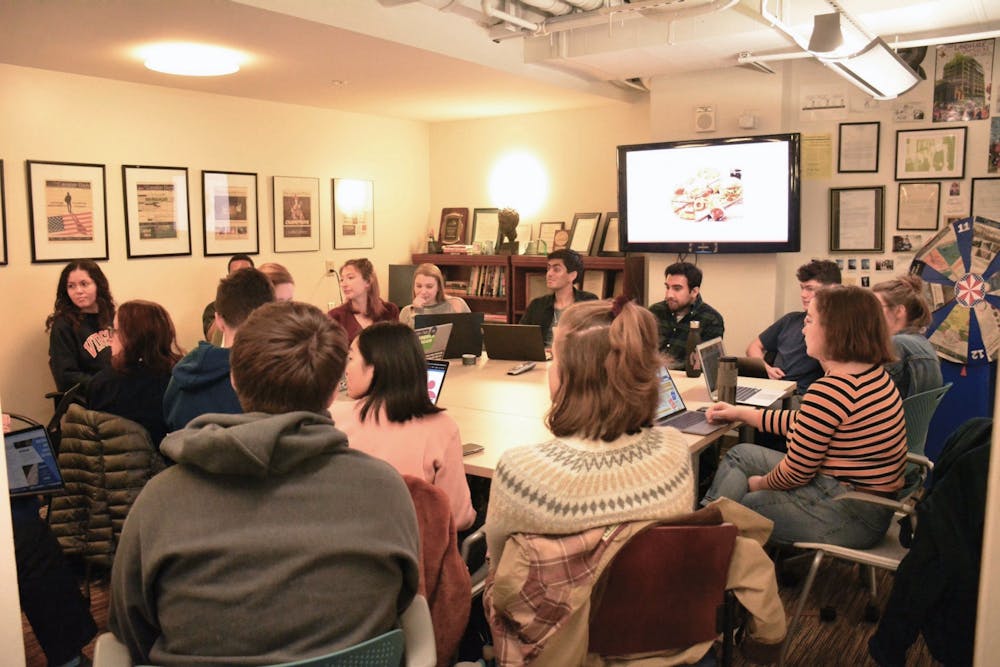During the Fall 2020 semester, The Cavalier Daily conducted an internal demographics survey to better understand the composition of our student staff and the barriers to access within our newsroom. As the journalism industry continues to reckon with a lack of representation, we recognize that The Cavalier Daily must also be held accountable for the diversity of our newsroom.
In order to be as transparent as possible, we are releasing this staff report to disclose which groups of students are writing about the University’s student body and community. Through this report, we acknowledge that there are several areas in which we are missing important perspectives on our staff. For instance, our newsroom is around 54 percent white, 78 percent heterosexual and 76 percent cisgender female. We have very few staff members from the Schools of Nursing, Education, Public Policy and Architecture. Additionally, we have a majority liberal newsroom. As the student-run newspaper at the University, we have a responsibility to fairly cover the stories and experiences of all groups within the communities we serve.
Simply put, representation is vital for our newsroom. The identities present on our staff directly affect the stories we choose to highlight and the ways we engage with our community. Releasing this staff report is just one way we are critically examining our newsroom and coverage, as we are regularly reevaluating our reporting to ensure we are operating through a lens of diversity and inclusion.
It is also important to note that our staff worked in a mostly remote newsroom this past semester due to the coronavirus pandemic, which has taken a severe physical, mental and financial toll on students. We have been forced to adjust to the unique challenges of juggling online school with jobs, family obligations and other responsibilities, and we recognize that these pressures all factor into students’ decisions to participate in extracurricular activities such as The Cavalier Daily.
After keeping the anonymous survey open for one month, 309 staff members responded to the survey out of 496 staffers total, a 62.3 percent response rate. The survey asked 17 questions in a multiple-choice, select-all-that-apply format on the following topics: current year at the University, current section(s), number of semesters on staff, school, major, residence status, status as a transfer student and first-generation college student, race and ethnicity, religion, sexual orientation, gender and political identity. This report also considers the demographics of the newspaper’s editorial staff. Throughout this report, “editors” refers to elected members of The Cavalier Daily’s junior and managing boards.
After an explanation of the data collected with comparison to Fall 2019, this report will include both short- and long-term suggestions for The Cavalier Daily’s demographic future. Spring 2021 recruitment will serve as an initial opportunity to correct many of these demographic inconsistencies and include a wider range of voices and contributors on The Cavalier Daily’s staff.
As we move into 2021 under new leadership, we hope this staff report will help grow the newspaper into a more accessible and equitable place.
School Year
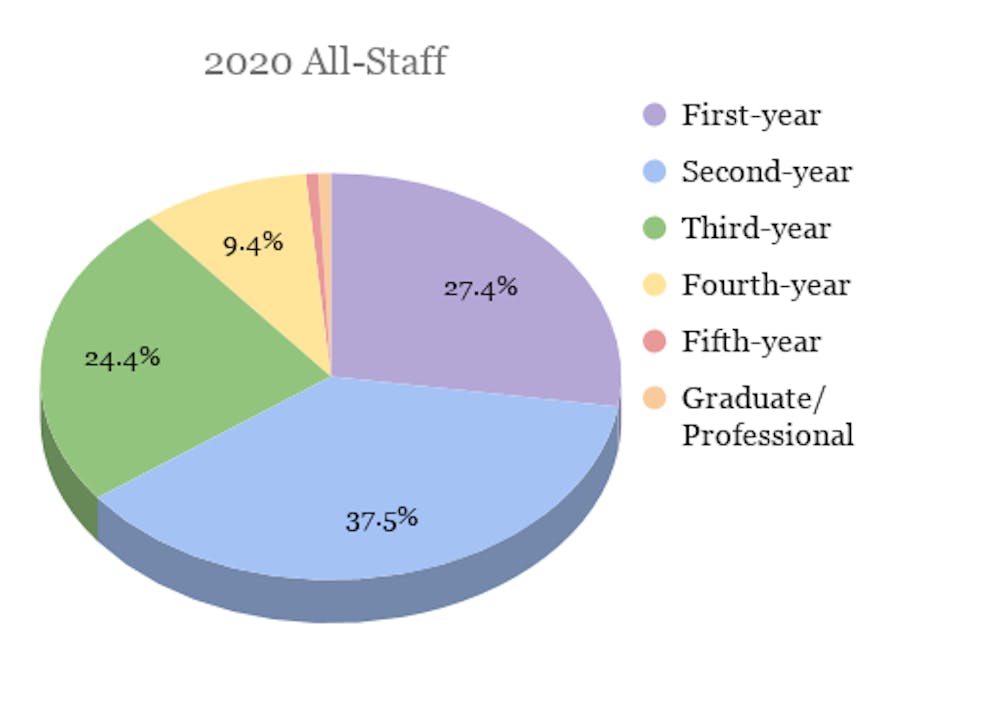
The Cavalier Daily is at its best when all members of the University community are included in its coverage, yet the vast majority of our staff members are undergraduate students — with 27.4 percent being first-years, 37.5 percent second-years, 24.4 percent third-years and 9.4 percent fourth-years. Meanwhile, fifth-year undergraduates and professional/graduate students make up a combined 1.4 percent of the staff.

Retaining current staff and recruiting more students from the University’s 12 graduate schools will be important as The Cavalier Daily moves forward so that all students on Grounds are able to get involved with the paper.
Current Section(s)

As The Cavalier Daily adapts to the digital age, it’s imperative that we continue our efforts to forge a stronger multimedia presence. Currently, the vast majority of our staff — 73.7 percent — are literary writers, whereas 20.5 percent are on the operations staff and 5.4 percent on the business staff. The most concerning disparity is found within the Video and Social Media teams, which make up a combined 1.6 percent of the paper. Growing these sections should be a focus for The Cavalier Daily to increase its production efficiency and storytelling capabilities in the digital-first era.
Number of Semesters on Staff
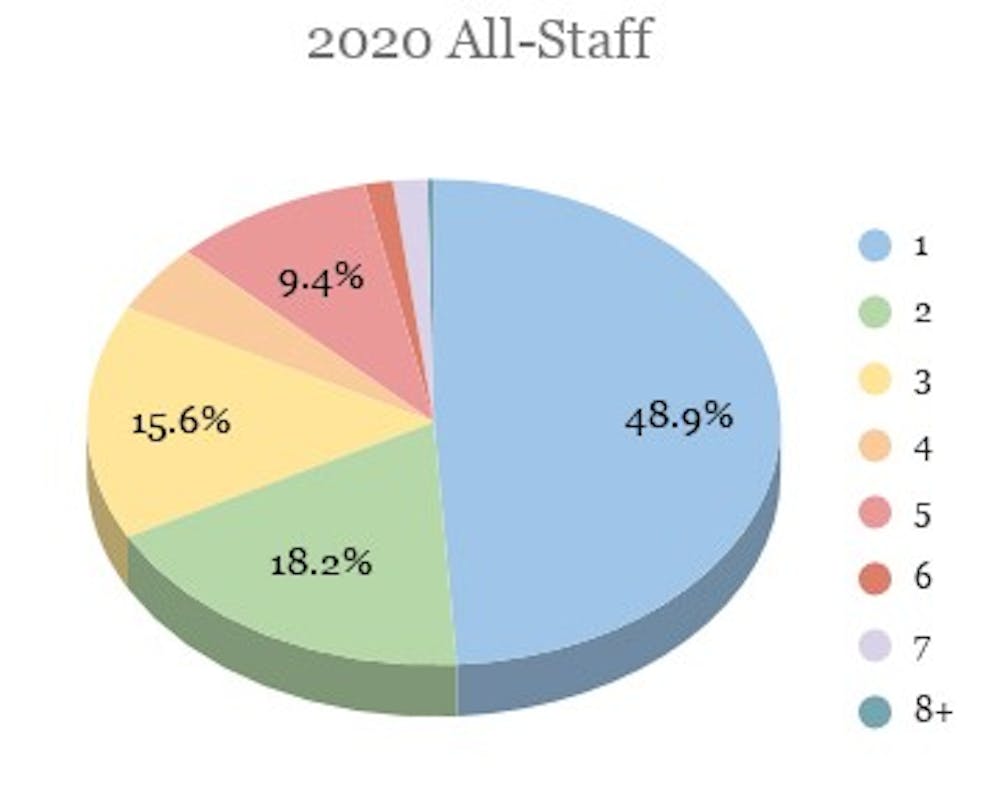

The Cavalier Daily received a record number of applications to join this semester, indicative of the growing importance of student journalism in our community as we navigate a pandemic. As such, roughly half of the current Cavalier Daily staff joined the paper during the Fall 2020 semester. While this figure is impressive, less than 18 percent of our staff have stayed for more than three semesters, meaning The Cavalier Daily must improve its retention efforts so that there are more experienced staff members on the paper who can provide helpful mentorship to newer staff members.
Current School

An overwhelming majority of The Cavalier Daily staff are students in the College of Arts & Sciences. Although this makes sense given the literary nature of journalism, much expansion is needed in order to take advantage of the diverse backgrounds and skill sets of students enrolled in all of the University’s schools.
The lack of members from other schools could be due to the academic demands of specific schools, or a misinterpretation of The Cavalier Daily as a solely literary entity. Engaging with students from other schools will add value to the paper with more specialized knowledge and different writing or management styles.
For instance, we should recruit more students with Engineering or Computer Science backgrounds to work on website management, data analytics and software development, which is especially important as we focus on creating a better reader experience. Similarly, students with Business or Finance backgrounds could work on advertising and marketing, while Nursing and Medical students may be interested in our Health & Science section.

Transfer Students
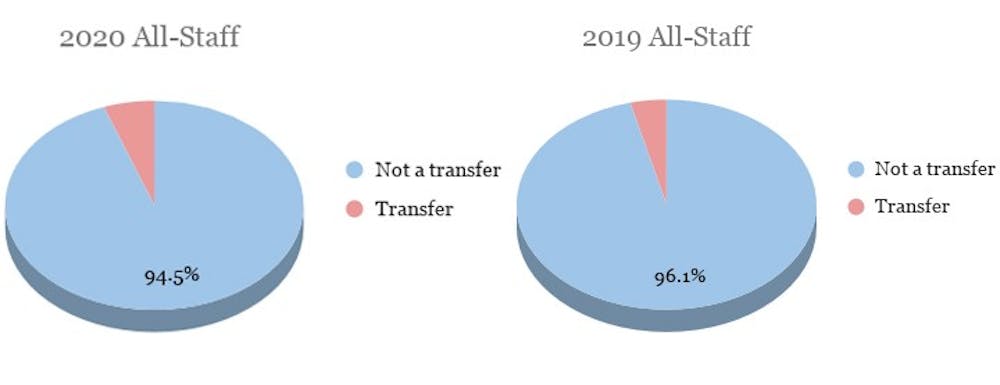
Roughly 3.7 percent of the University’s overall student body transferred from another school. Likewise, the vast majority of members on The Cavalier Daily are not transfer students, with 5.5 percent of staff members having transferred from another school — and none serving as editors. By encouraging transfer students to apply for editing or higher leadership positions, the publication can better provide the perspective of students who come from schools outside of the University of Virginia.
Enrollment Status
As an independent newspaper serving the University of Virginia community, The Cavalier Daily does not require that staff members be enrolled as full-time students at the University. However, 97.7 percent of our staff are full-time students, with a handful of part-time students — on par with the University’s overall enrollment.

First-Generation College Students

The Cavalier Daily staff is currently comprised of 10.7 percent first-generation college students — a four percent increase from 2017. This fall, the University's overall undergraduate enrollment was approximately 13 percent first-generation college students, indicating that The Cavalier Daily is maintaining a similar proportion of staffers for this particular student population, but should continue to attract and support first-generation college students.
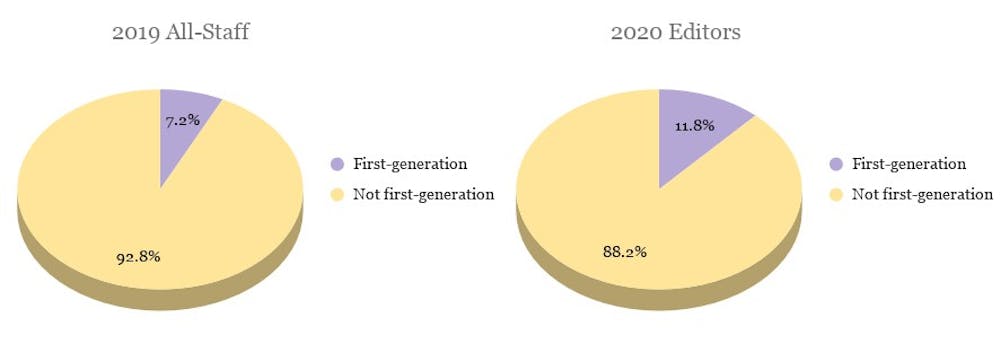
Financial Aid

28.3 percent of The Cavalier Daily staff receive some sort of need-based financial aid from the University, compared to 35 percent for the University student body as a whole.

Income
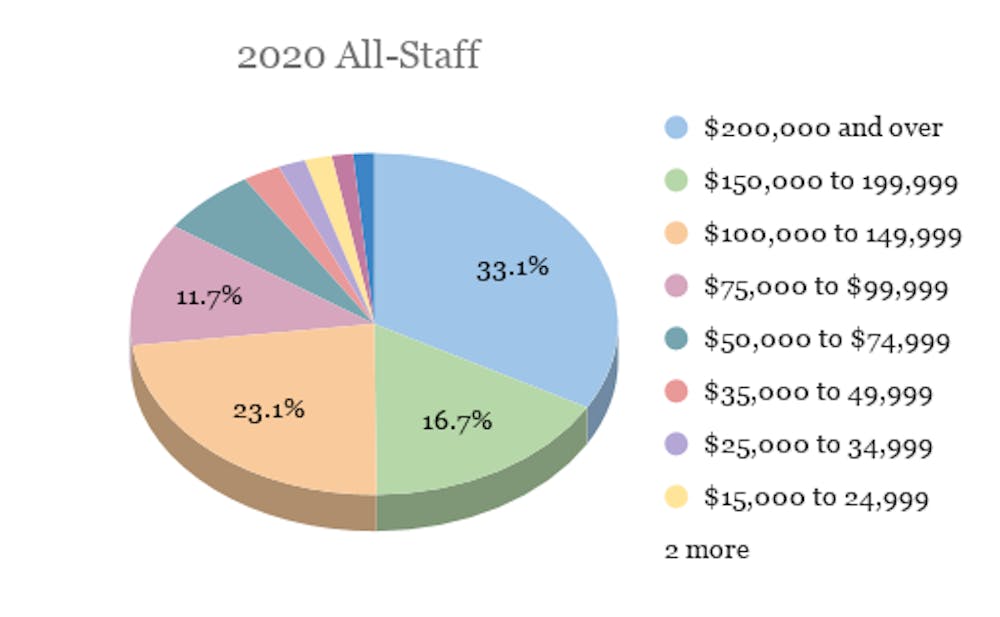
As one of the largest student groups at the University, The Cavalier Daily should be accessible for all students regardless of socioeconomic background.

Currently, 33.1 percent of our staff is comprised of students whose annual household income is $200,000 and over, 16.7 percent for $150,000 to $199,999, 23.1 percent for $100,000 to $149,999, 11.7 percent for $75,000 to $99,999, 6.4 percent for $50,000 to $74,999, 2.5 percent for $35,000 to $49,999, and 5 percent for below $34,999.
Residency Status

The Cavalier Daily’s staff is comprised mostly of in-state students at 66.4 percent of all staff members. While out-of-state and international students are in the minority at 27.4 percent and 6.2 percent, respectively, the ratio of in-state to out-of-state and international students roughly matches the University’s data for Fall 2020. Overall, approximately 69 percent of University students are in-state and 31 percent are out-of-state or international, indicating that The Cavalier Daily staff is an accurate representation of the undergraduate student body for this category.

Race/Ethnicity

Much like the University, The Cavalier Daily staff is majority white — with 54.1 percent of the total staff self-identifying as such, an 11.4 percent decrease from last year. 15.7 percent of the staff identified as East Asian or Pacific Islander, 11.1 as South Asian, 9.5 percent as multiracial, 4.6 percent as Black, 3.3 as Hispanic/Latinx, 1.3 percent as Middle Eastern, and 0.3 percent as Native American or Alaskan. Students who selected multiple races were grouped as multiracial.
The Cavalier Daily, which seeks to report on all perspectives, must focus on recruiting more students from a range of racial and ethnic backgrounds in order to better accomplish this goal. Although similar, our newsroom is not wholly representative of the University’s undergraduate population, which for the Fall 2020 semester is 56.5 percent white, 15.8 percent Asian, 6.8 percent Black, 6.8 percent Hispanic, 5.2 percent multiracial, 5 percent unknown, 4.2 percent non-resident alien, and 0.2 percent other.

Religion

The Cavalier Daily staff is comprised of 42.4 percent Christian students, while Agnostics, Atheists and “none” make up a combined 43.4 percent of the publication’s staff. Just as The Cavalier Daily can benefit from an increase in staffers from minority racial and ethnic backgrounds, it could also benefit from an increase of religious diversity.

Multilingual

Multilingualism refers to either knowing at least two languages as a result of one’s upbringing or from acquiring the skill of language fluency throughout one’s education. Currently, 40.3 percent of The Cavalier Daily staff identify as multilingual. Recruiting more multilingual speakers, and encouraging students who study language at the University to join the paper, will also help the publication bolster its Translation section.

Sexual Orientation

The Cavalier Daily staff is largely heterosexual/straight in sexual orientation, with 78.4 percent of staffers identifying this way, 12 percent as bisexual, 4.8 percent as queer/questioning, 3.4 percent homosexual and 1.4 percent asexual. It is critical for The Cavalier Daily to engage and include the LGBTQ+ community within its staff and coverage to better serve as a safe and inclusive space on Grounds.

Gender

The Cavalier Daily staff is currently 76.2 percent cisgender female, 23.5 percent cisgender male and 0.3 percent gender non-conforming. The University’s overall enrollment for the Fall 2020 semester is 56 percent female and 44 percent male.

Political Identity

The Cavalier Daily contains over 68 percent left-leaning staff members, which could affect the Opinion section and the public’s perception of The Cavalier Daily as an independent, unbiased source of news. Increasing right-leaning views and promoting a diversity of political opinions throughout the staff will not only help to diversify subjective content, but also prevent the paper from being seen as an outlet for mostly left-leaning students. Just 5 percent of survey respondents identified as right-leaning.

Steps for Improvement
Enhancing recruitment efforts
The vast majority of student staff members join The Cavalier Daily during our fall recruitment cycle, which typically takes place throughout September. However, because of the pandemic and the growing need for student journalism in our community, we decided to open recruitment earlier this year with an additional summer application cycle. Since then, The Cavalier Daily accepted over 150 new staff members and continued to recruit students for our News, Social Media and Health & Science sections throughout the fall semester on a rolling basis.
Our recruitment efforts involved presenting at the activities fairs hosted by Student Council, the Black Student Alliance and HackCville. We also held live information sessions, followed by open houses where prospective staff members could meet section editors and ask questions. Before the pandemic, these efforts would typically occur in person but we offered them through a virtual format this year. We also reached out to various departments and organizations across the University, requesting that they share application information with their members. Additionally, we shared recruitment materials such as graphics and videos on our social media pages. Our strategies intend to invite students of all backgrounds to feel welcome to apply.
However, we recognize that we must be more proactive in our approach. Our current and previous methods are largely digital and impersonal. Rather than connecting with communities and building relationships that encourage members to get involved in The Cavalier Daily, we extend a broad invitation to join a space that some may find unwelcoming. Furthermore, the digital nature of our self-promotion excludes students without reliable internet access, along with first-year and transfer students with limited networks, who may not come across our social media pages or know where to find our recruitment opportunities.
Moving forward, our organization should seek to establish sustainable relationships with communities on Grounds before soliciting their members for our own recruitment. For example, regularly communicating and consulting with leaders of groups that function as allies and representatives of marginalized communities could allow The Cavalier Daily’s leadership to identify where it can do better — in terms of recruitment, culture and, subsequently, content.
The diversity of our newsroom reflects the diversity of our coverage, and the sense of inclusion enacted by our editorial leadership determines which voices feel heard and valued on our staff.
Developing a culture of mutual understanding and respect
A foundation of mutual understanding and respect is essential for any organization. This is especially true for The Cavalier Daily, which intends to serve the entire University community. Our paper relies on its ability to maintain healthy relationships not only with University and Charlottesville community members, but also among our own staff members. As per the data outlined earlier, The Cavalier Daily has improved its overall staff diversity compared to prior years, but we can continue to do better in areas of gender, race and sexual orientation.
Responses to our census survey further emphasize the need to strengthen our staff’s diversity and culture of mutual understanding. For example, there were at least two instances of staffers who acknowledged that they did not understand the terms provided to indicate one’s gender as cisgender male, cisgender female, transgender male, transgender female or non-binary/gender non-conforming. While these two staffers comprise less than 1 percent of the survey’s respondents, these responses still represent a knowledge gap that can severely impact our ability to report on subjects in the space of diversity without proper information in areas like gender and race.
Therefore, we believe that more firmly establishing a year-long Diversity, Equity and Inclusion (DEI) committee would be essential to closely analyzing the opportunities for growth The Cavalier Daily has within its staff culture and demographic makeup. Prior terms have initiated versions of this DEI committee/working group, but each attempt did not result in a sustainable, long-term system for tackling these issues. Future terms of The Cavalier Daily Managing Board should collaborate with members of the Junior Board and staff to determine the best method for the paper to effectively start this DEI committee and to make it an integral part of the paper’s management.
Secondly, incorporating more frequent diversity training seminars throughout the academic year can help us educate staffers on essential topics in the space of diversity. These trainings can focus on a variety of subjects, including, but not limited to:
- General education on key terminology and current issues in the context of diversity
- The importance of acknowledging diversity in all aspects of journalism
- How one’s personal identity can shape the journalism process
- Broader conversations on demographics at the University and how these demographics impact our reporting process
Such training would complement the recruitment efforts described above to help all staffers feel welcome on the paper regardless of their background. In November, The Cavalier Daily partnered with the University’s Multicultural Student Center to host a “Social Identities 101” training for members of the Managing and Junior Boards. We plan to host similar training programs and other events, and would recommend that the next term of editors continue this effort to actively educate The Cavalier Daily staff on relevant diversity-based issues within the Charlottesville community.
Acknowledging the challenges to strengthening socioeconomic diversity
35 percent of University students receive need-based financial aid from Student Financial Services, and The Cavalier Daily reflects similar shortcomings in terms of economic diversity, especially that of underrepresentation of students from low- and mid-income levels.
Within the current structure of The Cavalier Daily, most staff members are not in positions in which they can earn any pay. Only the advertising staff can earn commissions off of their advertisement sales. With most of the staff serving in unpaid roles, this can cause some economic barriers.
Depending on a member’s role, the amount of time that one may need to commit to The Cavalier Daily may vary. For example, a staff writer likely does not need to commit as much time to the paper as their editor. While there is not specific data on the average amount of time that one may need to commit to The Cavalier Daily, it can be assumed that a staff member must spend at least 2 to 6 hours per week on work related to the paper, while editors and those in higher leadership positions may spend over 40 hours per week like a full-time job. For students who could otherwise use this time to supplement their income, this lack of pay poses a barrier to accessibility for low- and middle-income staff members.
We also acknowledge the increased financial hardships as a result of the COVID-19 pandemic that our staffers may face. For the safety of our staff, we have shifted to an almost entirely digital production for the time being. Nevertheless, this shift may put the burden of access to the necessary technology on our staff members, although staffers are welcome to use our technology, software and resources if needed.
Due to our lack of funding as a non-profit organization that relies on donations and advertisements, it would not be possible to pay staff members for their work at this time. Nevertheless, there have been several policy changes made this year that have sustained our revenue streams. For example, printing less frequently has helped in this capacity. While it is not certain that paying staff members would be entirely possible in the near future, these changes have allowed for this conversation to emerge. In the future, in order to achieve this goal, more of these changes in addition to an influx of donations is essential. For The Cavalier Daily to be a paid employment opportunity, we would need to secure additional funds, perhaps through an endowment, grant or donation.
Making The Cavalier Daily more accessible for students of different socioeconomic backgrounds would help ensure more equitable access. In doing so, this would allow a wider range of students the ability to participate on The Cavalier Daily without forgoing significant alternative financial benefits — bringing us closer to closing the equity gap for our staff.
Implementing practices to improve staff retention
There is a significant drop-off in retention between members of our staff for whom it is their first and second semesters. This could be indicative of a larger trend in which new students join many extracurriculars during their first semester at the University, then narrow down their commitments as they decide where to devote their time and energy. However, we also want to be cognizant of this difference and prioritize cultivating a culture where our staff members know that they are valued and are doing meaningful work. Such an environment could ensure that members feel welcome and are eager to return each semester.
To be certain we are doing all that we can to support a diverse staff, we recommend beginning with a follow-up survey that gauges staff members’ qualitative experiences with staff culture. For example, we are curious as to how staffers respond to prompts such as, “I feel like I’m part of a team,” and “I feel like a valued member of this organization.” Additionally, The Cavalier Daily must assess what it can do to ensure that it extends support and inclusion to every member of the team. Possible solutions include creating more opportunities for staff members to apply for leadership positions like editor, associate editor or senior staff member so they can have a larger influence on the paper’s coverage. We must also continue to actively encourage all staff members to shadow for editing positions, regardless of experience on staff.
Although the newsroom moves at a fast pace, The Cavalier Daily should not feel like a competitive environment. We typically recognize staff achievements in comments on their work or by listing them as authors of popular content on our website and at all-staff meetings. We strive to ensure that everyone at The Cavalier Daily knows that they matter and are celebrated beyond the context of content production. Finally, we suggest that future editors distribute a form that opens up the opportunity for staff members to voice optionally anonymous feedback.
Thank you for reading this report. If you have any suggestions, comments or questions, we would appreciate your input by emailing editor@cavalierdaily.com. For more information about joining our staff in the spring, please visit www.cavalierdaily.com/page/join.
Signed,
The Cavalier Daily Managing Board, 131st term:

